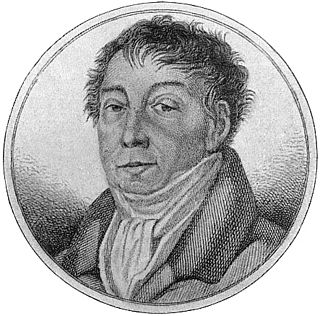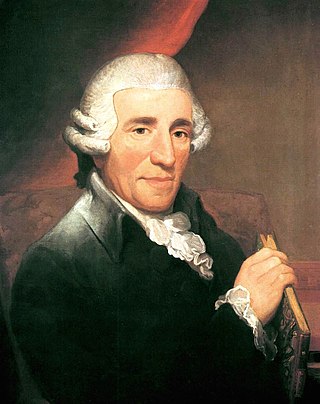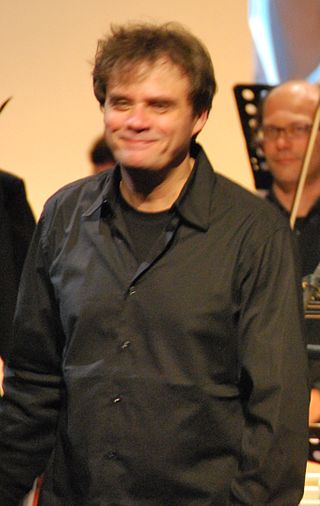
Luigi Marchesi was an Italian castrato singer, one of the most prominent and charismatic to appear in Europe during the second half of the eighteenth century. His singing was praised by the likes of Mozart and Napoleon.

Giuseppe Sarti was an Italian opera composer.

Alessandro nelle Indie is an opera seria in two acts by Giovanni Pacini to a libretto by Andrea Leone Tottola and Giovanni Schmidt, based on Alessandro nell'Indie by Pietro Metastasio. It was premiered at the Teatro di San Carlo in Naples on 29 September 1824, and had a total of 38 performances in its first season.

Fra i due litiganti il terzo gode is a dramma giocoso in two acts by Giuseppe Sarti. The libretto was after Carlo Goldoni's Le nozze.

Medonte, re di Epiro is an opera seria in three acts by Giuseppe Sarti. The libretto was by Giovanni de Gamerra for Felice Alessandri's opera Medonte, re d'Epiro (1774) and was later set by several other composers.

Armida is a 1784 opera in three acts by Austrian composer Joseph Haydn, set to an Italian-language libretto taken from Antonio Tozzi's 1775 opera Rinaldo, as amended by Nunziato Porta, and ultimately based on the story of Armida and Rinaldo in Torquato Tasso's poem Gerusalemme liberata.

Le gelosie villane is a dramma giocoso in three acts by Giuseppe Sarti. The libretto was by Tommaso Grandi. It was also known as Il feudatorio, Il feudatorio burlato and I contadini bizzari. It was also set by Pasquale Anfossi.

Prima la musica e poi le parole is an opera in one act by Antonio Salieri to a libretto by Giovanni Battista Casti. The work was first performed on 7 February 1786 in Vienna, following a commission by the Emperor Joseph II. The opera was first performed at one end of the orangery of the Schönbrunn Palace in Vienna by an Italian troupe; simultaneously, Mozart's Der Schauspieldirektor was staged at the other end.
Giulietta e Romeo is a dramma per musica by composer Niccolò Antonio Zingarelli with an Italian libretto by Giuseppe Maria Foppa after the 1530 novella of the same name by Luigi da Porto. The opera premiered at the Teatro alla Scala in Milan on 30 January 1796.

Giacomo David, was a leading Italian tenor of the late 18th and early 19th centuries.
Gennaro Astarita was an Italian composer, mainly of operas. The place of his birth is unknown, although he was active in Naples for many years. He began his operatic career in 1765, collaborating with Niccolò Piccinni in the writing of the opera L'orfana insidiata. He became the maestro di cappella in Naples in 1770.
Rondò is a type of operatic vocal solo, popular in the late 18th century. The name identifies both a musical form and the type of materials used.
Ginevra di Scozia is an opera in two acts by Simon Mayr set to an Italian libretto by Gaetano Rossi based on Antonio Salvi's Ginevra, principessa di Scozia, which in turn was adapted from cantos 5 and 6 of Ludovico Ariosto's Orlando Furioso. Ginevra di Scozia premiered on 21 April 1801 at the Regio Teatro Nuovo in Trieste to celebrate the inauguration of the new theatre. The story is virtually identical to that of Handel's Ariodante which shares the same source for the libretto.

Ottavio Dantone is an Italian conductor and keyboardist particularly noted for his performances of Baroque music. He has been the music director of the Accademia Bizantina in Ravenna since 1996.
Siroe is a dramma per musica or opera seria in 3 Acts by composer Pasquale Errichelli. The opera uses an Italian language libretto by Pietro Metastasio. The opera premiered at the Teatro di San Carlo in Naples on 26 December 1758. Vincenzo Re designed the sets for the premiere production.

Teatro San Samuele was an opera house and theatre located at the Rio del Duca, between Campo San Samuele and Campo Santo Stefano, in Venice. One of several important theatres built in that city by the Grimani family, the theatre opened in 1656 and operated continuously until a fire destroyed the theatre in 1747. A new structure was built and opened in 1748, but financial difficulties forced the theatre to close and be sold in 1770. The theatre remained active until 1807 when it was shut down by Napoleonic decree. It reopened in 1815 and was later acquired by impresario Giuseppe Camploy in 1819. In 1853 the theatre was renamed the Teatro Camploy. Upon Camploy's death in 1889, the theatre was bequeathed to the City of Verona. The Venice City Council in turn bought the theatre and demolished it in 1894.

Alonso e Cora is an opera seria in three acts by Francesco Bianchi. The libretto was by Giuseppe Foppa, after Ferdinando Moretti's Idalide, o sia La vergine del sole, as used by Giuseppe Sarti in Milan in 1783. The original source of this text was in turn Jean François Marmontel's Les Incas, ou La destruction de l'empire du Pérou (1777).

Il bravo, ossia La Veneziana is an opera in three acts by Saverio Mercadante to an Italian-language libretto by Gaetano Rossi and Marco Marcello. Their libretto was based on the play La Vénétienne by Auguste Anicet-Bourgeois, which was in turn based on James Fenimore Cooper's novel The Bravo. The opera premiered on 9 March 1839 at La Scala, Milan and subsequently played throughout Italy and abroad. The opera was still being occasionally performed and recorded in the 20th century. and was hailed as an "exciting rediscovery" when it was staged by the Wexford Festival in 2018.

Caterina Canzi, also known as Katharina Wallbach-Canzi, was an Austrian-born soprano who sang leading roles in the opera houses of Europe, primarily in Italy and Germany. Amongst the roles she created were Isolde in Lindpaintner's Der Vampyr and the title role in Mercadante's Nitocri.











